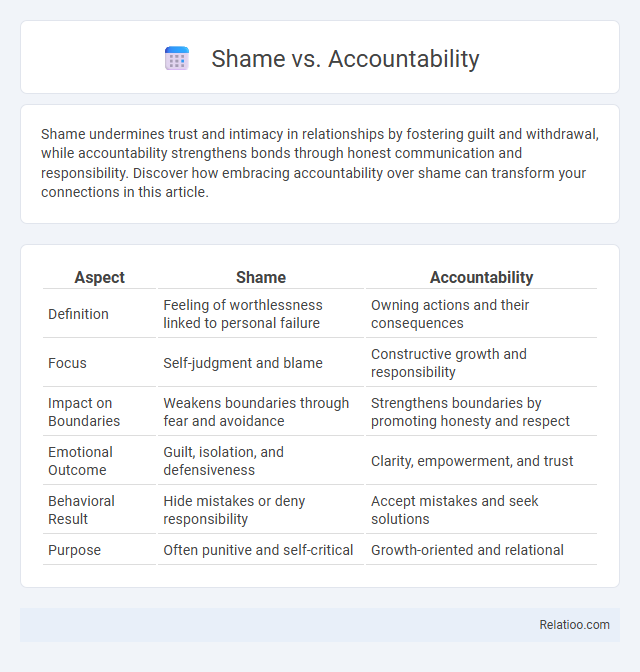Shame undermines trust and intimacy in relationships by fostering guilt and withdrawal, while accountability strengthens bonds through honest communication and responsibility. Discover how embracing accountability over shame can transform your connections in this article.
Table of Comparison
| Aspect | Shame | Accountability |
|---|---|---|
| Definition | Feeling of worthlessness linked to personal failure | Owning actions and their consequences |
| Focus | Self-judgment and blame | Constructive growth and responsibility |
| Impact on Boundaries | Weakens boundaries through fear and avoidance | Strengthens boundaries by promoting honesty and respect |
| Emotional Outcome | Guilt, isolation, and defensiveness | Clarity, empowerment, and trust |
| Behavioral Result | Hide mistakes or deny responsibility | Accept mistakes and seek solutions |
| Purpose | Often punitive and self-critical | Growth-oriented and relational |
Understanding Shame: Definition and Impact
Shame is a deeply painful emotion arising from the perception of being flawed or unworthy, often leading to feelings of isolation and diminished self-worth. Unlike accountability, which involves taking responsibility for actions to foster growth and learning, shame can hinder personal development by triggering avoidance and self-criticism. Understanding shame's psychological impact helps you differentiate between harmful self-judgment and constructive accountability, enabling healthier emotional responses.
What is Accountability? A Clear Overview
Accountability involves taking responsibility for one's actions and their consequences, fostering personal growth and trust in relationships. It requires acknowledging mistakes without fear or guilt, which distinguishes it from shame that focuses on negative self-judgment and emotional pain. Embracing accountability promotes constructive behavior changes, enhanced communication, and resilience.
Psychological Roots of Shame
Shame originates from a deep psychological sense of inadequacy and self-judgment, often rooted in childhood experiences and societal expectations that teach You to internalize fault. Unlike accountability, which encourages responsibility and growth through honest self-reflection, shame creates a paralyzing fear of rejection and unworthiness. Understanding these psychological roots helps differentiate shame's debilitating effects from the constructive nature of true accountability.
The Role of Accountability in Personal Growth
Accountability plays a critical role in personal growth by fostering self-awareness and encouraging responsibility for one's actions without the negative impact of shame. Unlike shame, which can lead to feelings of worthlessness, accountability promotes constructive reflection and motivates positive change. When you embrace accountability, you empower yourself to learn from mistakes and develop resilience, driving meaningful progress in your personal and professional life.
Shame vs Accountability: Key Differences
Shame involves feeling worthless or flawed, often leading to hiding or withdrawal, whereas accountability focuses on taking responsibility for actions and making amends without self-condemnation. Shame tends to damage self-esteem by internalizing failure as personal defect, while accountability promotes growth through acknowledging mistakes and learning from them. Understanding this difference is crucial for healthy emotional development and effective interpersonal relationships.
How Shame Affects Behavior and Relationships
Shame triggers feelings of worthlessness that often lead to withdrawal, defensiveness, and disrupted communication in relationships. Unlike accountability, which fosters growth and trust by encouraging responsibility for actions, shame induces fear of judgment and avoidance of vulnerability. Persistent shame erodes self-esteem, hindering emotional connection and promoting unhealthy behavioral patterns that strain interpersonal bonds.
Benefits of Embracing Accountability
Embracing accountability fosters personal growth by encouraging individuals to take ownership of their actions and learn from mistakes, leading to improved decision-making and resilience. It strengthens relationships through trust and transparency, creating an environment where constructive feedback promotes continuous improvement and collaboration. Accountability enhances professional development by motivating goal-setting and responsibility, which drives productivity and long-term success.
Strategies to Move from Shame to Accountability
Transforming shame into accountability involves recognizing and naming feelings without self-judgment, enabling emotional clarity and growth. Practicing self-compassion enhances resilience and encourages ownership of actions rather than self-condemnation. Strategies such as mindful reflection, seeking supportive feedback, and setting actionable goals promote constructive behavior change and strengthen personal responsibility.
Cultural Perceptions of Shame and Accountability
Cultural perceptions of shame and accountability vary widely, influencing how individuals navigate social expectations and personal responsibility. In collectivist societies, shame often serves as a powerful social regulator, encouraging conformity and reinforcing community harmony, whereas in individualistic cultures, accountability emphasizes personal growth and ethical standards without stigma. Understanding these cultural nuances helps you approach accountability in a way that promotes constructive self-reflection rather than paralyzing shame.
Building a Culture of Accountability Without Shame
Building a culture of accountability without shame fosters trust and encourages open communication, enabling team members to take responsibility for their actions without fear of humiliation. Emphasizing constructive feedback and growth helps individuals learn from mistakes while maintaining their dignity and motivation. This approach promotes psychological safety, resulting in higher engagement, collaboration, and overall organizational performance.

Infographic: Shame vs Accountability
 relatioo.com
relatioo.com